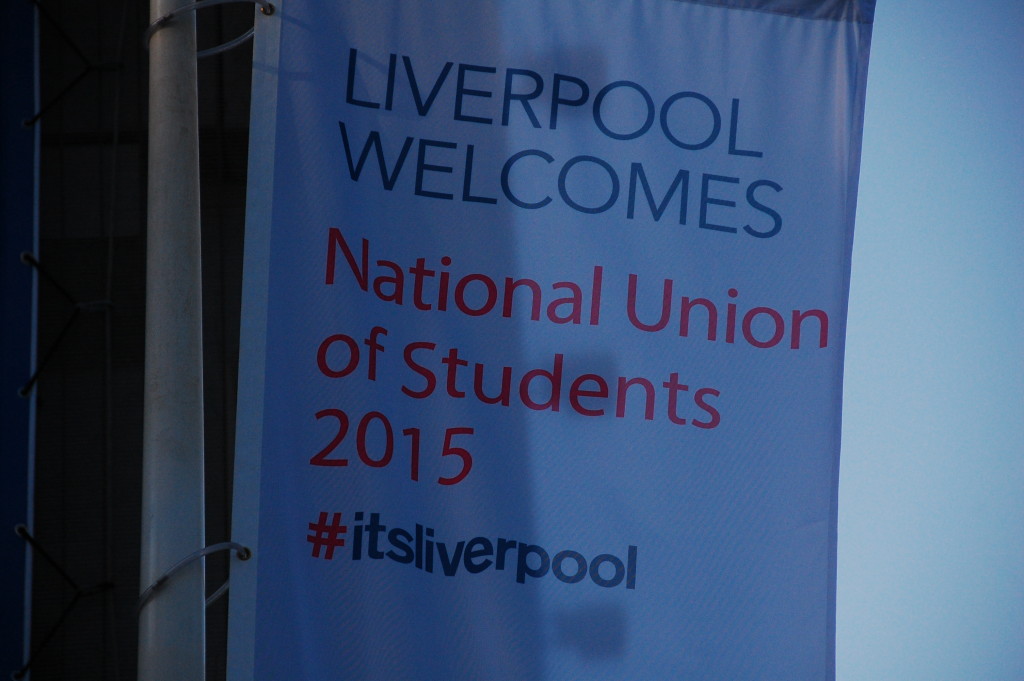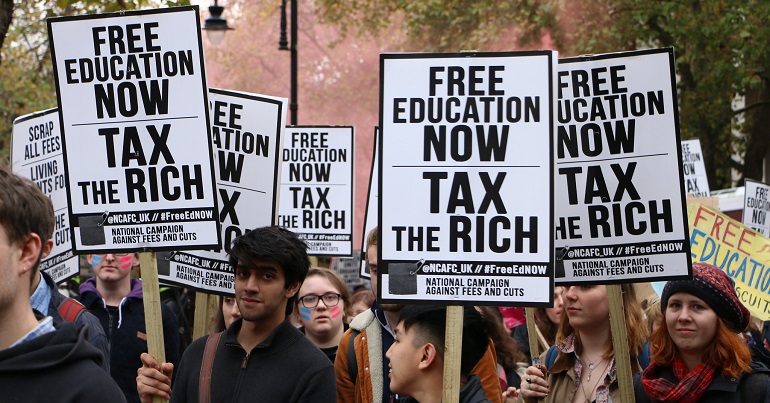Grassroots radicalism drives change at NUS
Young Green David Stringer gives his thoughts on this year’s NUS Conference.

For two decades the NUS has had a reputation as both a fluffy debating club, and a union which withholds its criticisms of the Labour Party in return for senior officers being fast-tracked through the Labour Party. Six of the last fifteen NUS Presidents have represented or are representing Labour as Parliamentary candidates, one more in the House of Lords. It appears that a change has now begun.
This was my first conference, but it seems broadly agreed that 2015 was a much more left-wing conference than it has been for many years.
This was clear from the beginning. The Priority Motion was to condemn the record of the coalition government, and an amendment also condemning Labour for lack of opposition not only passed, but by a fairly big margin and with enthusiastic cheers.
But the conference wasn’t without cynical partisan trickery.
The big motions on Tuesday were Motion 211 (reaffirming commitment to free education) and Motion 212 (calling for NUS to back a demo for free education later in the year, regardless of who the government is at the time).
The cheap tricks started with delaying tactics on Motion 210 (Bad organisation and management makes for a bad university experience). Every motion so far had been settled with a speech in favour, a speech against and a summation (or often just the first of the three). Motion 210, however, found itself subjected to a procedural motion to debate it in parts, meaning it took a considerable amount of time to debate one of the least complicated motions.
Before Motion 211 (Free Education), a vote of no confidence was used as a delaying tactic against the Chair—who hadn’t been in the position for long, and had put in an uncontroversial performance. Understandably, it fell short of the hundred required for it to be heard, and the debate on the motion began. Three passionate rounds of speeches were made for and against free education, with the speakers against arguing that with free education, taxes for ordinary people would go up; that the higher ceiling for repayment meant that the changes had been “proven to be fairer”; and that making higher education free would encourage people to stay in education forever. Outgoing NUS Scotland President Gordon Maloney gave a barnstorming summation arguing in favour of free education, saying the Scottish system made more sense, and that Scotland had been able to dig deeper into the issues around education and student life, having dealt with “the fucking tuition fee elephant in the room”. Although 211 passed to rapturous applause, there was no more time to debate Motion 212 (National Demonstration for Free Education and against student poverty), which will now be handed over to National Executive Committee to deal with.
Also on the opening day, NUS President Toni Pearce gave a passionate speech in defence of NUS’s ‘Liar Liar’ campaign, targeted against the Lib Dem and Tory candidates who went on the record supporting free education, then voted to raise tuition fees. The campaign had been met with criticism before and during the conference, with the Tory/Independent Presidential candidate Leon French withdrawing from the conference entirely as a result.
My view is that it’s a definite positive to see the NUS actively getting involved in the main political arena, but that it’s relatively easy to attack the Lib Dems, given their current reputation. The real challenge will be whether any future Labour government that disappoints or deceives students is met with the same response.
Wednesday saw the main elections.
With the withdrawal of the other candidates, what had been a broad field in the Presidential election came down to a choice between Megan Dunn and Beth Redmond, both having supported the principle of free education. Beth has been a key organiser with, and the endorsed candidate of, the National Campaign against Fees and Cuts (NCAFC), one of the leading groups behind the ‘free education’ movement, while Megan is a former member of NCAFC. This conference was the first time I’d seen Beth Redmond in person. She’s an irrepressible force of nature, but, having made a lot of her status as an outsider, it was inevitable that she’d lose out to Megan, the outgoing Vice President Higher Education.
Sorana Vieru won a contest between three strong candidates for VP Higher Education, against Hattie Craig (endorsed by NCAFC) and Poppy Wilkinson (one of the few candidates to carry a ‘Labour Students’ tagline and seemingly, going by the t-shirt endorsements, heavily backed by that group). The speeches may have sealed the victory for Sorana – her pro-immigration, pro-free education speech was powerful, while Poppy Wilkinson’s was strangely flat. Having met Poppy Wilkinson the previous week, she gave a better impression in both her manifesto and conversation than she did in her speech – it’s a shame she didn’t perform as well on the podium.
It was interesting that Hattie Craig came a distant third, despite being the endorsed candidate of NCAFC. NCAFC are, along with Student Assembly Against Austerity, one of the main factions supporting free education, so to see the free education vote rally behind another candidate shows the extent to which it’s a grassroots movement with a life of its own, rather than one dominant faction within NUS being replaced by another.
One of the things that surprised me about the elections in general was how few of the candidates openly identified with a political party. While this is understandable at SU level, at national level I feel more transparency is needed, so delegates at least know the pressures and support candidates are likely to receive if elected. I was more inclined to vote for Poppy Wilkinson, for instance, because she made it clear on her manifesto and choice of tagline that she was aligned with Labour, despite that not being my own allegiance. While I accept most candidates won’t be devious, I know of one candidate who has recently switched from one political party to another, who in the run-up to the conference was appealing to members of both for votes based on party loyalty – with more transparency we wouldn’t have such problems.
Piers Telemacque was re-elected as VP for Society and Citizenship, which, given his easy charisma and track record of fighting for youth and community centres, was the most predictable of the elections.
Shakira Martin was elected as VP for Further Education, citing Piers’ victory the previous year as an inspiration for her. Having made a couple of speeches during the previous day and a half, it’s clear that those of us who want the NUS to be a defiant, strong-minded institution couldn’t hope for a better embodiment than Shakira.
Probably the most exciting result of all was that of Shelly Asquith, who was elected as VP for Welfare, having spent the last few years balancing the practical work of campaigning for more investment from her university with offering support to activists at the edge of the law. When you see how far she’s gone to support activists around the country while working as SU President of University of the Arts London, it’s incredibly exciting to think about her doing the same with the formal backing of the NUS.
In Germany, free education became such a hot topic that it became difficult for politicians to win office without backing it. Though it’s only a start, five of six full-time NUS officers next year are on record as speaking in favour of free education; only Richard Brooks has not made his support clear.
There was drama on Wednesday evening, with the proposed appointment of Andrew Westwood as a trustee challenged because of his past as a Special Advisor to the Blair government, with a motion being called to refer the appointment back to NUS. At first this challenge for his appointment to be referred back was upheld, but on a manual count, Westwood was appointed by 161 votes to 157. From what I’ve read on Westwood afterwards, it does seem the right choice to appoint him (I voted to refer the decision back both times, on the basis that it’s better to play safe than make a bad choice), but there’s two important things learnt from the process.
Firstly, I don’t feel delegates were given enough information about Westwood, either from the President proposing him, or the objector, Barnaby Raine, who seems to have a reputation for going out of his way to ask awkward questions of an organisation reputedly run by a closed clique. Secondly, mere association with the Blair government was this year so toxic that it was nearly enough to block a trustee’s appointment by itself. The consequences of the Blair government’s lies and deceit are still being felt, which should be a warning to future governments.
The final round of elections took place on Thursday morning, with 32 candidates standing for the ‘Block of 15’. (For those who aren’t familiar with the format of NUS, the various full-time elected officers are held to account at National Executive Committee meetings by a group of fifteen part-timers.) Because of the complicated system designed to make sure as many areas as possible are represented—with reserved places for both women and Further Education students—the winners of this election won’t be announced until late next week, probably Thursday 30th.
But there’s a strong set of candidates with a decent chance of making the cut – NCAFC’s Beth Redmond, Callum Cant and Hannah Webb; Young Green and free education organiser Sahaya James; Areeb Ullah, who wants to prioritise helping SUs fight back against misuse of the charity commission to shut down protest; Socialist Students’ Ben Mayor and Courtney Robinson, the latter President of Northern Ireland’s largest student union, where she campaigned for abortion rights; Living Wage campaigner Michael Segalov; Barnaby Raine; Charley Hasted, who spoke reasonably and persuasively several times through the conference and who used her Block speech to underline the importance of reintroducing EMA. Of course, it’s unlikely that all ten of those will make the cut, but there’s a strong chance that the Block of Fifteen will keep a left-leaning senior team pulled to the left.
Making sure that the NUS is run in a way suitable for both radical campaigning and giving practical development advice is only a middle step, towards the larger goal of ensuring students’ voices are heard and respected by the political establishment. But this was a week when the British student movement moved boldly leftward.


Leave a Reply